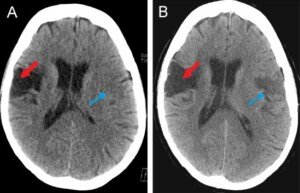Shouldn’t an elderly person take a blood thinner for stroke prevention even if they don’t have atrial fibrillation?
Advanced age is a risk factor for an ischemic stroke. The blood clot may originate in the brain or in a carotid artery and travel to the brain.
Such a blood clot in the brain obstructs blood flow to the area that the vessel feeds, depriving that area of oxygen.
This then causes sudden onset of symptoms which may consist of any of the following: vision disturbance, slurred speech, facial paralysis, confusion, one-sided paralysis or weakness, and feeling heavy on one side.
Coumadin, whose generic name is warfarin, is a common blood thinner that helps reduce the “stickiness” of blood and hence, has been proven effective at preventing blood clots that cause stroke – which is the leading cause of disability in the U.S.
But must an elderly person have A-fib in order to get a prescription for Coumadin?
“According to the AHA/ASA 2021 guidelines on stroke, Coumadin or other forms of anticoagulants are not recommended for prevention of stroke in people without atrial fibrillation (AF),” says Dr. Jacob Hascalovici MD, PhD, who’s with the Department of Neurology at Hackensack Meridian Health.
“AF is often difficult to diagnose, and some people who have recurrent cryptogenic (no known cause) embolic-appearing strokes might actually have paroxysmal [occurring only periodically] AF.
“Stroke protocols are rapidly evolving, but the current standard of care is not to prescribe anticoagulants for prevention of stroke to anyone who does not have a clear diagnosis of AF or paroxysmal AF.
“This being said, I have seen individual providers and patients choose to start patients who have had frequent, recurrent, embolic-appearing cryptogenic strokes on anticoagulants for secondary prevention after having a discussion with the patients about the risk and benefits of the medication.”

Stroke CT scan; 0475ramosk, CC BY-SA
Coumadin Risks
All prescription drugs come with potential risks or side effects. These are listed on their inserts and can also be discussed with the prescribing physician.
A notable possible side effect of Coumadin is internal bleeding, which can occur in the gut as well as the brain.
In fact, taking Coumadin increases the risk of a condition for which old age is a major risk factor: a slow brain bleed known as a chronic subdural hematoma.
Stroke Prevention
If you’re concerned about stroke — which strikes about 800,000 Americans every year — here are five steps to help prevent this common occurrence.
Dr. Jacob Hascalovici, aka “Dr. Jacob,” is a diplomat of the American Board of Psychiatry and Neurology in both adult neurology and pain medicine, and is a clinical assistant professor of neurology, physical medicine & rehabilitation and anesthesiology at Albert Einstein College of Medicine.
 Lorra Garrick is a former personal trainer certified through the American Council on Exercise. At Bally Total Fitness she trained women and men of all ages for fat loss, muscle building, fitness and improved health.
Lorra Garrick is a former personal trainer certified through the American Council on Exercise. At Bally Total Fitness she trained women and men of all ages for fat loss, muscle building, fitness and improved health.
.










































